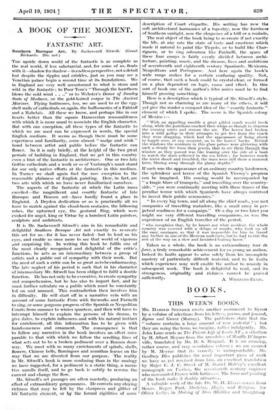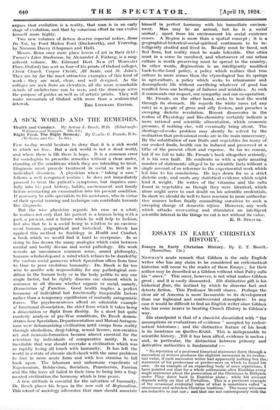BOOKS.
THIS WEEK'S BOOKS.
MR. HAROLD SPENDER erects another monument to Byron by a voluble of selections from his letters, poems, and journal, Byron and Greece (Murray). The publishers state that the " volume contains a large amount of new material " ; but they are using the term, we imagine, rather indulgently. Mr. John Lane sends us The Private Life of Louis XV., a selection by M. Albert Meyrac from the anecdotes of Mouille D'Anger- vile, translated by Mr. II. S. Ningard. It is an amusing, rather coarse, and very scandalous volume ; we are assured by M. Meyrac that its veracity is unimpeachable. Mr. Geoffrey Bles publishes the most important piece of work we' have as yet received from him, an excellent translation by Major C. J. C. Street of M. Daniel lIaMvy's excellent Monograph on Vauban, the scvi.uteenth century engineer who surrounded France with fortresses. The form and printing of the book make it doubly. attractive.
A valuable work of the late Dr. W. H. Rivers eimies from Messrs. Kepi' Paul, Medicine, Magic, and Beli,giwi. Sir Ledge, in Making of Man (Hddder and Stoughton)
argues that evolution is a reality, that man is in an early stage of evolution, and that by conscious effort he can evolve himself more highly.
Two new volumes of fiction deserve especial notice, Some Do Not, by Ford Madox Ford (Duckworth), and Yesterday, by Norman Davey (Chapman and Hall).
Messrs. Benn once more place lovers cf nit in their debt : Turner's Liber Studiorum, by Alexander J. Milberg, is a mag- nificent volume. Mr. Edmund Hort New (17 Worcester Place, Oxford) has sent us four of his prints of Oxford colleges, Christ Church; Corpus Christi, All Souls, and St. John's. They are by far the most attractive examples of this kind of work : they are neat, clear, and well designed. As the colleges are seen from an elevation, all the more remarkable details of architecture can be seen, and the drawings serve the purpose of guides as well as of artistic prints. They will make memorials of Oxford with more than a sentimental



































 Previous page
Previous page